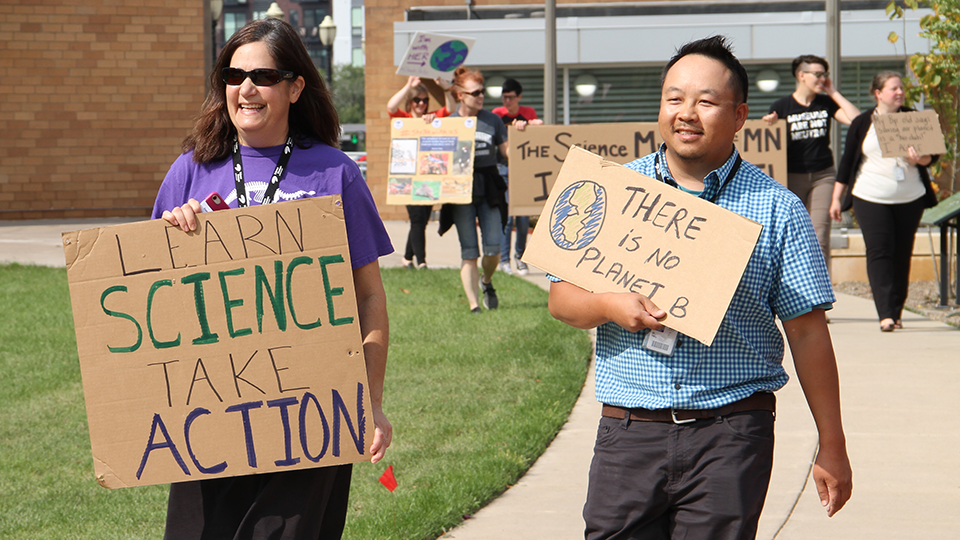
The changing climate is a social justice issue
“Equity is at the heart of reversing climate change. Our collective challenge is to fundamentally change our behaviors, our habits, and our lifestyle to reduce carbon emissions, end the age of fossil fuels, and sustain a liveable planet for all.”
— Joanne Jones-Rizzi, Vice President of Science, Equity, and Education
Science Museum of Minnesota
I’ve learned while working at the Science Museum of Minnesota to view situations, ideas, and life through a variety of lenses. We work hard to bring together our core pillars of science, equity, and education, because it is when these three priorities come together that we do our best work. Science clearly tells us our planet is in trouble. We know the climate is changing and it is disproportionately affecting low-income countries and poor people in high-income countries. Climate change is a social justice issue, and we all need to understand this intersectionality (the overlap between the social impacts and environmental science of climate change). To make a real difference, consider how to take action to improve the current climate crisis through multiple lenses.
“It is the poor that actually suffer the most when there's an environmental injustice … and it's the poor that stand to benefit the most from an energy revolution.”
— Kumi Naidoo of Africans Rising for Justice, Peace, and Dignity
I saw environmental injustice with my own eyes during a tour in New Orleans, LA. The tour was led by Leon Waters, founder of the Louisiana Museum of African American History and organizer of Hidden Histories tours; Anne Rolfes, founding director of the Louisiana Bucket Brigade—a citizen science organization; and Monique Verdin, tribal council person for the United Houma Nation. During this tour I witnessed the impact of industry on the environment and culture of New Orleans, as well as the historical transitions from plantations to refineries along the “Cancer Alley” corridor in the River Parishes. Even on a rainy morning, standing in neighborhoods in the shadows of refineries and other industries, all of my senses understood the impact industry and the changing climate has on life in these communities.
You don’t have to go to the other end of the Mississippi to witness the changing climate. Minnesota is warming slowly but surely. In the past 130 years, our state warmed by 2.9º F, while averaging 3.4 inches of additional annual rainfall. And although an extra 2.9 degrees may sound minor (and even welcome to Minnesotans at times!), its negative impact is significant. Minnesotans are already paying the price—literally—with homeowner’s insurance rates surging 68% in the past ten years due to a deluge of natural disasters in our state. But these impacts don’t affect everyone equally. People with less resources, from both urban and rural communities, suffer the most. Think about the farmers whose fields are underwater due to the more frequent and intense rainfall, and the urban poor who are exposed to much more pollution due to where they live day-after-day and generation-after-generation.
Nearly six in ten (58%) Americans are now either “Alarmed” or “Concerned” about global warming. From 2014 to 2019, the proportion of “Alarmed” nearly tripled. We should all be alarmed or concerned—whether we are directly affected or not. The problems are real, they’re here now, and they’re in desperate need of scientific solutions. To find those solutions, we must focus all of our intellectual firepower. But systems of social inequity mean that we’re shorting ourselves; we’re subjecting ourselves to a limited perspective and therefore a limited solution. We’re not harnessing all of our collective knowledge and creativity, and that needs to change.
There is still much we can do to stand up for science, together. ALL of us. We know that science, equity, and education can lead the way. This intersection is our superpower and the time to act is now. Be part of the solution and make a difference.
Do you want to learn more about climate change as a social justice issue? On this 50th anniversary of Earth Day, check out these resources and be inspired to take action:
Get involved with MN350 uniting Minnesotans as part of a global movement to end the pollution damaging our climate, speed the transition to clean energy, and create a just and healthy future for all.
Take action with COPAL to fight for environmental issues with racial and economic disparities in mind.
Stand up with the International Indigenous Youth Council and see how you can support the Twin Cities chapter.
Understand how climate change is already displacing thousands of people right now through this interactive article about climate migration.
Hear this interview with Thiagarajan Jayaramana, a professor at the School of Habitat Studies at the Tata Institute of Social Sciences, Mumbai, India, who has focused on climate action and climate justice for more than a decade.
Learn about the work of the Climate Justice Alliance—they envision a world in which fairness, equity, and ecological rootedness are core values.